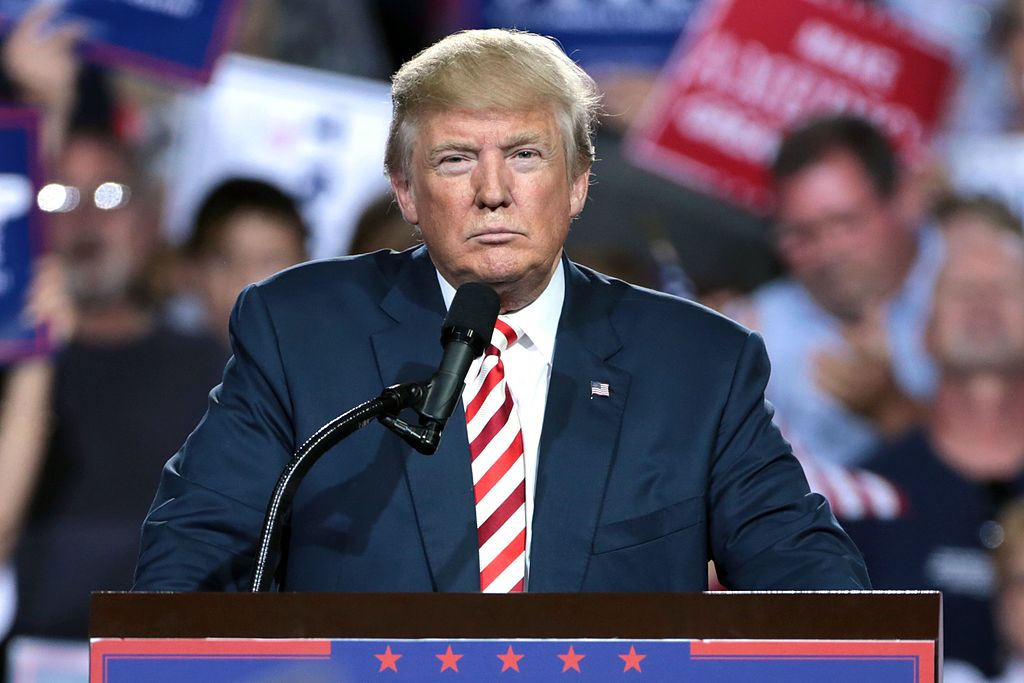Donald Trump has ignited widespread concern and backlash following a controversial statement at Friday's Turning Point Action's Believers' Summit. Addressing a crowd of loyal supporters in West Palm Beach, Florida, the Republican presidential nominee asserted that if they vote for him in the upcoming election, they "will never have to vote again."
The speech, tailored to unite Christians across America, featured Trump urging the crowd to vote, suggesting that after "four more years," the need for voting would be obsolete. This ambiguous remark has sparked alarm among U.S. voters, raising fears that Trump might seek to alter election rules should he return to the White House, as per Indy100.
Trump's exact intentions with this statement remain unclear. Some speculate it might be another instance of his infamous rambling speeches, where his words often lead to confusing or contradictory statements. However, the implications of suggesting the end of the democratic voting process have not gone unnoticed.
Democratic leaders quickly responded to the video of Trump's speech. Representative Pramila Jayapal called the statement "terrifying," emphasizing the need to prevent such a scenario. House Leader Nancy Pelosi condemned the remarks, reminding the public of Trump's past statements suggesting he would act as a dictator if re-elected. She pointed to previous comments where Trump called for the termination of the Constitution and pledged to end democracy.
Kamala Harris, who is favored to replace Joe Biden as the Democratic nominee, issued a strong statement comparing Trump's rhetoric to that of a dictator. She stressed the importance of preserving democratic values and warned against the dangers of such authoritarian language.
Concerns about Trump's potential to govern as a dictator are not new. In December 2023, he shared a word cloud on his Truth Social platform that included terms like "revenge" and "dictatorship" to describe his vision for a second term. This raised alarms among political analysts and citizens alike, fearing a shift towards autocratic governance.
The controversial remarks come at a critical time as the nation gears up for the 2024 election. Trump's ability to galvanize his base with provocative statements continues to be a hallmark of his campaign strategy. However, the implications of his rhetoric are causing increasing unease among voters and political figures across the spectrum.
This incident underscores the polarized nature of American politics, where every statement from high-profile figures like Trump is scrutinized and analyzed for potential impacts on the nation's democratic processes. The suggestion that voting could become obsolete under his leadership raises serious questions about the future of democracy in the United States.
As the election approaches, the debate over Trump's intentions and the potential consequences of his rhetoric will likely intensify. Voters are left to grapple with the implications of a leader who, intentionally or not, evokes images of authoritarian rule.



 U.S. Announces Additional $6 Million in Humanitarian Aid to Cuba Amid Oil Sanctions and Fuel Shortages
U.S. Announces Additional $6 Million in Humanitarian Aid to Cuba Amid Oil Sanctions and Fuel Shortages  New York Legalizes Medical Aid in Dying for Terminally Ill Patients
New York Legalizes Medical Aid in Dying for Terminally Ill Patients  Trump Says “Very Good Talks” Underway on Russia-Ukraine War as Peace Efforts Continue
Trump Says “Very Good Talks” Underway on Russia-Ukraine War as Peace Efforts Continue  India–U.S. Interim Trade Pact Cuts Auto Tariffs but Leaves Tesla Out
India–U.S. Interim Trade Pact Cuts Auto Tariffs but Leaves Tesla Out  US Pushes Ukraine-Russia Peace Talks Before Summer Amid Escalating Attacks
US Pushes Ukraine-Russia Peace Talks Before Summer Amid Escalating Attacks  Netanyahu to Meet Trump in Washington as Iran Nuclear Talks Intensify
Netanyahu to Meet Trump in Washington as Iran Nuclear Talks Intensify  Jack Lang Resigns as Head of Arab World Institute Amid Epstein Controversy
Jack Lang Resigns as Head of Arab World Institute Amid Epstein Controversy  China Warns US Arms Sales to Taiwan Could Disrupt Trump’s Planned Visit
China Warns US Arms Sales to Taiwan Could Disrupt Trump’s Planned Visit  Trump Signs Executive Order Threatening 25% Tariffs on Countries Trading With Iran
Trump Signs Executive Order Threatening 25% Tariffs on Countries Trading With Iran  Pentagon Ends Military Education Programs With Harvard University
Pentagon Ends Military Education Programs With Harvard University  Nighttime Shelling Causes Serious Damage in Russia’s Belgorod Region Near Ukraine Border
Nighttime Shelling Causes Serious Damage in Russia’s Belgorod Region Near Ukraine Border  Trump Allows Commercial Fishing in Protected New England Waters
Trump Allows Commercial Fishing in Protected New England Waters  South Korea Assures U.S. on Trade Deal Commitments Amid Tariff Concerns
South Korea Assures U.S. on Trade Deal Commitments Amid Tariff Concerns  TrumpRx.gov Highlights GLP-1 Drug Discounts but Offers Limited Savings for Most Americans
TrumpRx.gov Highlights GLP-1 Drug Discounts but Offers Limited Savings for Most Americans  Trump Allegedly Sought Airport, Penn Station Renaming in Exchange for Hudson River Tunnel Funding
Trump Allegedly Sought Airport, Penn Station Renaming in Exchange for Hudson River Tunnel Funding  Norway Opens Corruption Probe Into Former PM and Nobel Committee Chair Thorbjoern Jagland Over Epstein Links
Norway Opens Corruption Probe Into Former PM and Nobel Committee Chair Thorbjoern Jagland Over Epstein Links  TrumpRx Website Launches to Offer Discounted Prescription Drugs for Cash-Paying Americans
TrumpRx Website Launches to Offer Discounted Prescription Drugs for Cash-Paying Americans 































